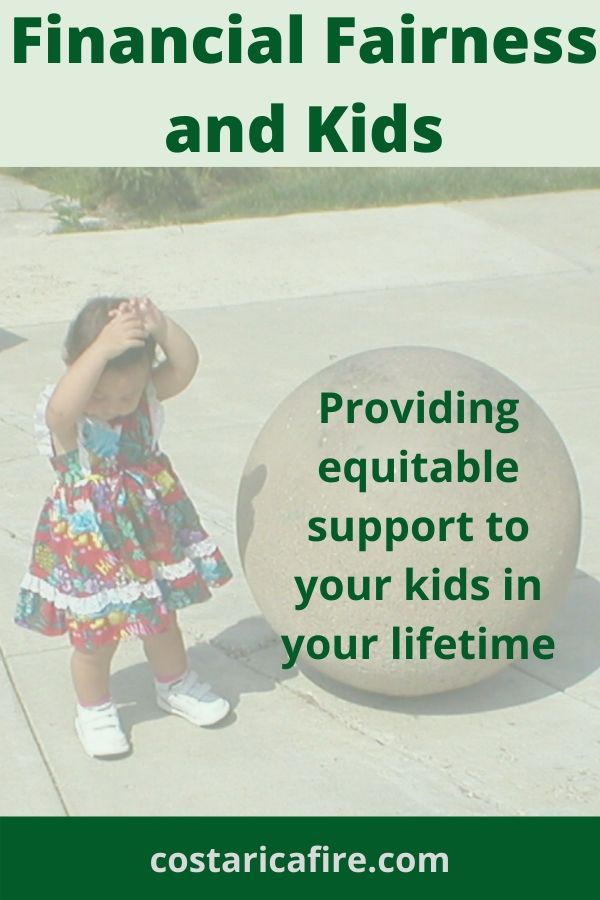As part of our recent estate planning, our assets will be split 50/50 between our kids. That seems fair, but how equally have we provided support, or will we provide support, during our lifetimes?
“…if that scorecard of lifetime gifts isn’t roughly equal at the time of the parents’ death, then there’s a problem. Not a legal problem — a family problem.”
So says Jeffrey Condon, co-author of Beyond the Grave: The Right Way and Wrong Way of Leaving Money to Your Children (and Others) and co-founder of Condon and Condon law firm in Santa Monica, CA.
Financial fairness when it comes to raising children (including adult children) has been the subject, not only of books like Condon’s, but numerous articles:
- “Thinking about giving money to adult children? Think again.” – New York Times (where the Condon quote is cited)
- “Is it OK to give more financial help to one grown child than another”? – CBS Marketwatch
- “Should you treat your kids equally in your will?” – Kiplinger
We treated our kids equally in our wills
When we were young parents, we put a boilerplate will together just to ensure our guardian of choice was named for our kids. That estate plan split everything 50/50, down the middle between our two children. Once our youngest turned 18 and legally became an adult, we updated our estate plans to reflect the changes that almost two decades inevitably bring – e.g., changes to our assets, required documents like healthcare proxies and powers of attorneys for our now-adult kids.
We still decided on splitting everything 50/50 in terms of dollars. We did give our oldest more responsibility as successor manager to our LLC’s, secondary power of attorney and secondary healthcare proxy. With two each of LLC’s, powers of attorney and healthcare proxies, we could have split these responsibilities 50/50. However, our oldest is better suited for the tasks. Of course, we discussed it with her first, and true to our suspicions, she seemed unflappable about her role.
Given the additional work she would need to do, should we compensate that? I do think about it, and perhaps we will make some arrangement. But at this point, we are focused on tying up all the loose ends for our updated estate plan – it has been an adventure retitling our real estate and other assets. I hadn’t thought about writing in a compensation element, and I don’t want to add any more changes to our estate plan right now.
Perhaps compensation for the estate plan work comes early – in adulthood support
Our youngest is still in college, so how much help she’ll need to be self-sufficient in adulthood is still TBD. However, our oldest is two years after graduating from college and still getting financial support from us to varying degrees, depending on how business is going. Currently she lives in our New York City apartment, is on our cell phone plan and uses our online grocery delivery account.
The apartment is the biggest expense, but we bought it so that we would always have a place in New York City. Having her stay there doesn’t cost us extra (perhaps a small uptick in utilities), and she maintains the place while we’re gone. She also uses the second bedroom, so our stuff remains plug and play when we drop in for a visit. We could charge her rent, and she has offered, but we don’t need the money and know she’s a good saver with what money she does earn, so we haven’t gone down that road. If we ever want to sell the place, that’s when we’d have to tackle what to do with the apartment.
The cell phone is a family plan, and keeping her on there saves 80% or possibly more over what she would have to pay for a solo account, so it makes sense to keep her on there. I suppose we could charge it back to her too, but like rent, it seems more trouble than it’s worth.
The online grocery account is a new expense since the pandemic. Formerly, she did her own grocery shopping IRL like most people. I’m glad she can use our account because we’re longtime customers and have a reserved delivery spot. Getting grocery delivery in New York City during the height of the pandemic was like landing tickets to Hamilton!
The groceries are a bigger expense than the cell phone, so depending on how long the pandemic goes on, I may ask her to switch the card on file to her credit card. But perhaps this is the compensation for the estate plan work.
The adulthood support equalizes what we paid in college support
We don’t mind giving our oldest financial support now because her college expenses were next to nothing. She attended a local college, so lived at home for most of the time. She also got a full tuition scholarship, so we paid nothing at a time that college tuition was running $15,000 to $50,000 per year (city v. private). Yes, the cost of four years of college can be as much as buying a house.
In fact, what our youngest will spend on her private college is about equivalent to what we spent for our Bronx apartment! Even though our youngest got some scholarship money, because she elected to go to a private college, the remaining balance owed is still tens of thousands per year. Right now, she’s borrowing that money, and we’ll decide after she graduates how much she’ll repay and how much we will. But if we repay the whole amount of college debt for our youngest, and gift the New York City apartment to our oldest, then we’ll still keep the scorecard even.
Childhood expenses are also a factor when expensive extra-curriculars are involved
Both of our children were involved in dance activities, which entails specialty clothing (the cost of ponte shoes really adds up!) and several classes per week. In addition, our youngest branched out into musical theatre, which include acting, singing and stage productions. If I compare these expenses, our oldest gets shortchanged, probably by several thousand dollars.
Of course, you could also look at clothing, food, medical and other expenses that will likely differ among children. Keeping the financial scorecard even is difficult with absolutely certainty. I think both of our kids would say that we were behind them 100%, and they were able to wholeheartedly pursue their interests. In that way, childhood spending is still 50/50.
Our focus with money and kids is a longer timeframe – multi-generational wealth
Our kids have a long way to go, and we’d like to help them for as long as we can. In fact, we’re managing our portfolio with multiple generations in mind. Rental real estate is a great way to build an income stream that matches inflation.
Having real estate in different geographies – and in places that are nice to visit – is another way to have income, plus family trips if our family grows enough that we want to meet up in fun destinations.
We didn’t buy real estate or invest abroad as a family legacy, but it’s a very nice plus.



 We are Scott and Caroline, 50-somethings who spent the first 20+ years of our adult lives in New York City, working traditional careers and raising 2 kids. We left full-time work in our mid-40’s for location-independent, part-time consulting projects and real estate investing, in order to create a more flexible and travel-centric lifestyle.
We are Scott and Caroline, 50-somethings who spent the first 20+ years of our adult lives in New York City, working traditional careers and raising 2 kids. We left full-time work in our mid-40’s for location-independent, part-time consulting projects and real estate investing, in order to create a more flexible and travel-centric lifestyle.  Financial independence and early retirement is not something we originally focused on, but over time realized it was possible. Our free report,
Financial independence and early retirement is not something we originally focused on, but over time realized it was possible. Our free report, 








We offered to pay for college for all three of our kids but only at the price of affordable state schools. If they wanted to go to a private college they would have to make up the difference on their own. We could have afforded any college costs easily but their mom and I feel like a degree is a degree and paying extra for private or out of state education is not fiscally sound, something we won’t support. All three chose the state U and fortunately even though we were wealthy high earners they got free rides to college plus room and board anyway. They all got their four year degrees that way and then went on for advanced degrees. We did not fund graduate school even though the first four years were free to us. We did not fund any expensive extracurricular activities but instead encouraged them to work in high school and college which they all did. Now they are all very cost conscious and self sufficient adults as well as being successfully employed at good jobs. We always felt we were not raising kids, we were raising adults and that we owed them the obligation of sending them out in the world ready to compete and win. They will all be multimillionaires some day just from inheritance of our estate but until then we would not take from them the opportunity to make it on their own, that’s priceless. But all of these decisions are very personal. I wouldn’t criticize anyone for choosing to do differently. Raising kids is a mysterious art and you just do the best you can. And the results don’t always match the effort. I’ve seen kids from ideal environments self destruct and kids from awful parenting turn out fine. I handled my parents seven figure estate for myself and my brother. It was a little bit of work but not enough that I would have felt good about getting more than my exact 50%. With a good estate plan and a good lawyer it isn’t really all that bad.
Thank you for the perspective! I’m glad the estate work wasn’t too onerous — I really have no idea, and of course, I’d be dead…I hear you about state schools — for our kids, local was right for our oldest, but I think it would have been tougher on our youngest. It’s so funny how two kids raised the same can still turn out so differently. As for extra-curriculars, we didn’t push jobs on our kids. That was probably my upbringing since Scott had jobs. I did the errant babysitting, tutoring work but mainly I was into music. I studied at Juilliard Pre-College which broke the bank for my single mom but it was life-changing for me, so I happily paid for any arts stuff for the kids (would have done sports too). So many ways to raise kids — and agree 100% the parenting choices only go so far anyway!
I’m not a parent but I’d suggest keeping things pretty equal between the 2 kids as far as adult support/college goes. The one getting scholarships and attending state school is saving you a ton of money, as you’ve mentioned. Once the kids are out of school you’ll have a more accurate picture of what you’ve spent on each kid. I wouldn’t discount the value of the housing provided in NYC while kid is in school. The gift can be in the form of asset transfer like the condo, or could be cash towards that child’s life goal such as down payment help on a home elsewhere. No telling where NYC kid will move to after school.
As far as paying the kid(s) who take care of your POA etc when you are in need of that service, then YES please make sure they get something extra (even beyond your death) besides the hourly rate suggested by Medicaid lawyers, because it is a lot of work and stress, and can tie up the POA person in responsibilities for years. I’m POA for both parents right now but my sister generously offered to take over Mom’s finances, and is in the process of getting a new POA prepared for Mom where sister is primary. I have lost track of how much time I’ve spent on my dad’s affairs but it is not inconsequential, including single handedly packing up and cleaning his house in preparation for sale, and dealing with all the sale details. I’ve lost many days of work and spent many hours. The acceptable hourly rate for POA duties is far less than what I make at my day job, and since he will end up on Medicaid in less than a year I have to be very careful as to what I pay myself for my duties.
Good point about using standard guidelines for hourly rates. We are trying to arrange affairs so there’s not too much work, but of course, “too much” is in the eye of the beholder. Fair compensation always helps!